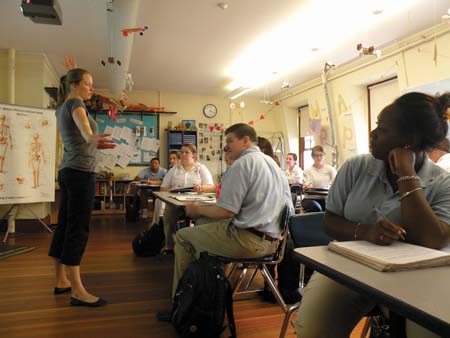September 29, 2011
 Members of the Boston Collegiate Charter School’s eleventh grade talk cellular biology with teacher Meredith Leavitt.
Members of the Boston Collegiate Charter School’s eleventh grade talk cellular biology with teacher Meredith Leavitt.
While recently-released results from the Commonwealth’s 2010 MCAS tests show many schools struggling to meet performance targets, charter schools like Dorchester’s Boston Collegiate Charter School are ranking among the state’s best performers.
Tenth grade students at Boston Collegiate ranked first in the state on English Language Arts and Math exams this year, with all students scoring at either the advanced or proficient levels. Other area charter schools to earn top rankings included the Edward Brooke, Boston Preparatory, and Excel Academy.
Related: Charter school successes pose challenge to city system
The most recent round of MCAS results marks the highest grades earned by BCCS students in the school’s 13-year history, an accomplishment BCCS executive director Shannah Varón attributes to a growing sense of community fostered between the nearly 600 students attending classes and their faculty. To further that goal, BCCS officials have recently announced a new alumni service program, which they hope will establish mentoring opportunities for students past and present.
“We’ve made an effort to create real bonds between faculty, students and families,” Varón said. “More and more of our students are reaching the decision-making points in the 7th and 9th grades and choosing to stay with us, even the ones accepted to schools like Boston Latin, because we’ve built a community for them.”
While Varón said her staff was proud of the school’s MCAS performance, she explained that the school places a greater emphasis on college gatekeeper tests like the SAT and ACT, which last year led to a 100 percent college acceptance rate among outgoing seniors.
BCCS high school principal Jenna Ogundipe was quick to highlight the efforts of her teachers, 40 percent of whom have been with the school since it opened its doors on Mayhew Street in 1988 and are frequently visited by administrators throughout the school day to ensure students are being pushed to excel.
The school’s accelerated curriculum and inclusive model has proven popular among parents and students and the increasing number of applicants to enter the school pushed administrators to open a second lower campus on Sydney Street at the beginning of the 2010 - 2011 school year.
The MCAS tests proved challenging for schools statewide, with 82 percent of schools falling below performance targets established by the No Child Left Behind Act and leading to 64 percent of schools now designated as in need of restructuring, corrective action or improvement based on the severity of their score deficits.
Despite these troubling results, Massachusetts Charter Public School Association spokesman Dominic Slowey said a recent compact signed by the Boston School Committee and charter school officials could foster a new era of cooperation between the two education systems, allowing public school’s to adopt some of the policies that have proved successful in charter schools.
The compact comes after years of animosity between district and charter schools, with district schools arguing that charters can cherry pick the best and brightest students while receiving state funding earmarked for standard school programs.
“For years, school districts across the state have spent more time trying to fight us than learn from us,” Slowey said. “This compact will hopefully help us function as the labs of innovation we are intended to be, we want district schools to see us as partners, not pirates.”
Topics:


